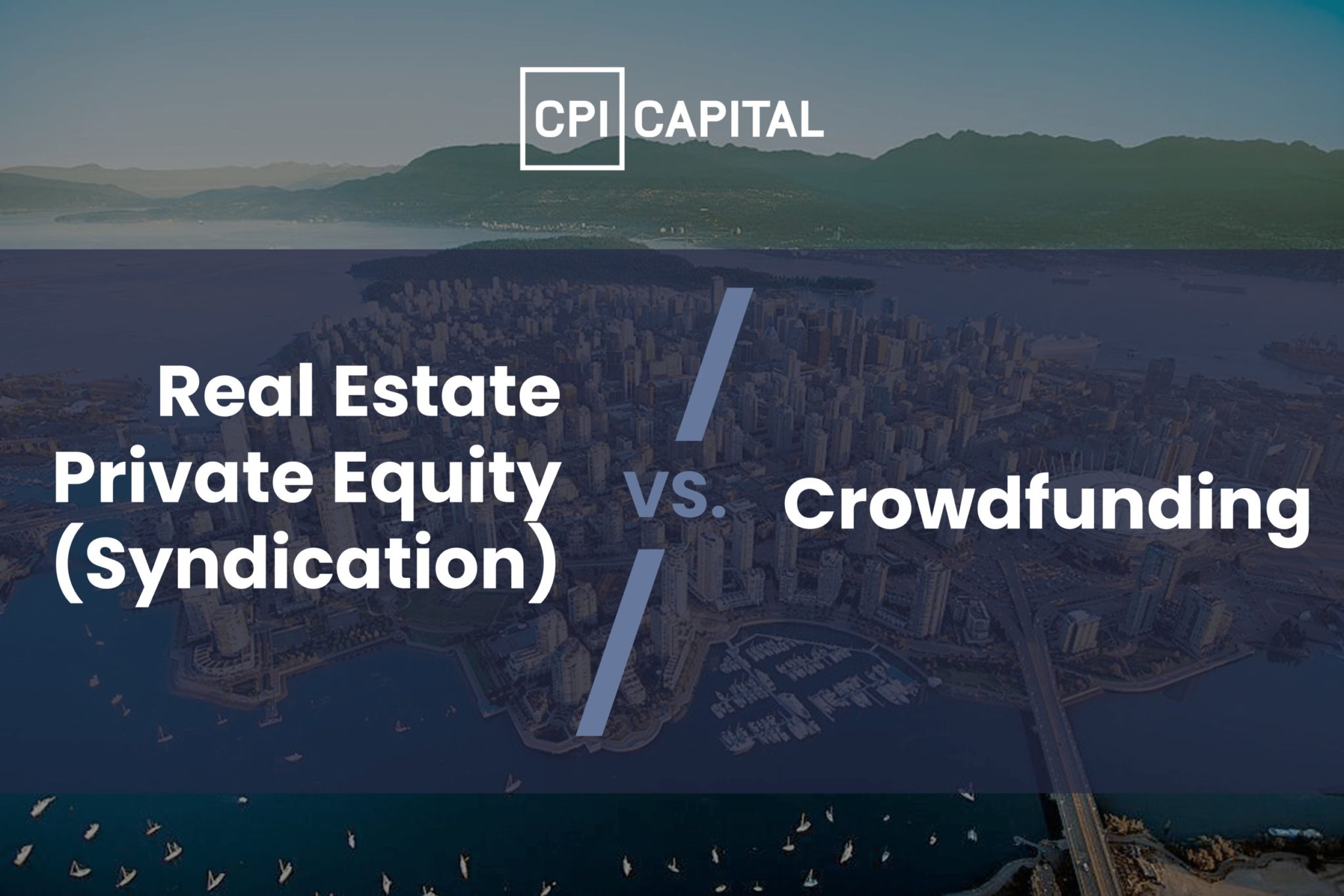
This article describes the differences between real estate syndication and crowdfunding. It discusses how CPI Capital is addressing a historical drawback of real estate investing and how it’s mitigating the risks of conventional crowdfunding.
What is Real Estate Syndication?
Real estate syndication involves individuals pooling resources to jointly invest in real estate assets and share in the profits. Real Estate Private Equity (REPE) or Private Equity Real Estate (PERE) refers to firms that raise capital from private investors to buy and sell real estate. If you’re familiar with traditional private equity, real estate private equity is much the same, but with property.
Real estate syndication is essentially a type of funding relationship. By pooling resources and working with a Real Estate Private Equity firm, investors can participate in larger deals than they could afford on their own, without the hassles of finding and managing a property themselves. Investors play a passive role, meaning the sponsor is responsible for managing the day-to-day operations of the property.
What is Crowdfunding?
Crowdfunding is a process through which an individual or a business can raise money from a large number of people, typically through the Internet. For example, you may have heard of or donated to a GoFundMe or KickStarter account. The goal is to raise sufficient funds in order to carry out a specific project or make a specific investment. There are different types of crowdfunding, but real estate crowdfunding has become extremely popular with investors since it was first introduced in the US through the the JOBS Act of 2012, which aimed to lessen regulations on small businesses and legalize equity crowdfunding.
What is Real Estate Crowdfunding?
Real estate crowdfunding refers to a specific method of connecting investors with a real estate private equity company, allowing investors to use an online platform to learn about and participate in investment opportunities. While the terms syndication and crowdfunding are often used interchangeably, they are not synonymous. Real estate syndication is a funding relationship, or agreement, between the investors and a sponsor. Crowdfunding is one method of finding investors.
Owning real is a great way to diversify your portfolio in addition to stocks, bonds, and other publicly traded securities. Investing directly in real estate can offer strong returns, however, most people lack the large amount of equity and property management experience required for operating large properties. Real estate crowdfunding removes these barriers and allows investors to participate in real estate investments through fractional ownership and without needing to get involved in managing the property.
Naturally, there are some limitations with real estate investing and crowdfunding. Historically, a disadvantage of investing in real estate was that it’s less liquid than other investments, meaning it can’t easily or quickly be exited. Selling a property clearly takes more time and effort than selling publicly traded shares. Crowdfunding platforms, like Fundrise and GoFundMe, have some additional drawbacks:
- Normally there is a target investment period for each deal, so investors may have to hold onto their investment for anywhere from 18 months to five years or more.
- Investment offerings on these platforms are commonly for funds (eREITS) where it can be unclear what the underlying asset is.
- Money earned through online real estate crowdfunding platforms is treated as ordinary income which may not be not very tax efficient and create a higher tax obligation for high income earners.
- Unfortunately, crowdfunding platforms can enable fraudulent activity. Online forums and social media are ideally suited for crowdfunding because they offer wide reach and convenient marketing, but this also makes it easier for fraudsters to attract equity crowdfunding for dubious ventures from naive or first-time investors. Always perform due diligence on any investment you’re considering!
Through its innovative partnership with TokenFunder, a licensed exempt market dealer and Canada’s first regulatory-compliant investing platform specializing in digital securities, CPI Capital is removing the risks and breaking down barriers to make it radically more efficient for accredited investors to own and profit from institutional-grade investments in US multifamily real estate.
At CPI we specialize in acquiring value-add multifamily real estate with a new technology-enabled approach and a time-tested wealth-building strategy that allows our investor community to build wealth 100% passively. Using a Limited Partnership investment structure and tokenization through a licensed exempt market dealer, CPI provides the best of both worlds – professional vetted and fully compliant US multifamily real estate investments, with the liquidity of conventional equities.
To learn more about Real Estate Private Equity, real estate crowdfunding, CPI Capital and TokenFunder, please get in touch with us and join our investor community.
Yours sincerely,
– Ava Benesocky
CEO, Co-Founder Canadian Passive Investing
– August Biniaz
Chief Strategy Officer, Co-Founder Canadian Passive Investing

Ready to build true wealth for your family?
It all starts with passive income. Apply to join the CPI Capital Investor Club.
Search
Recommended
